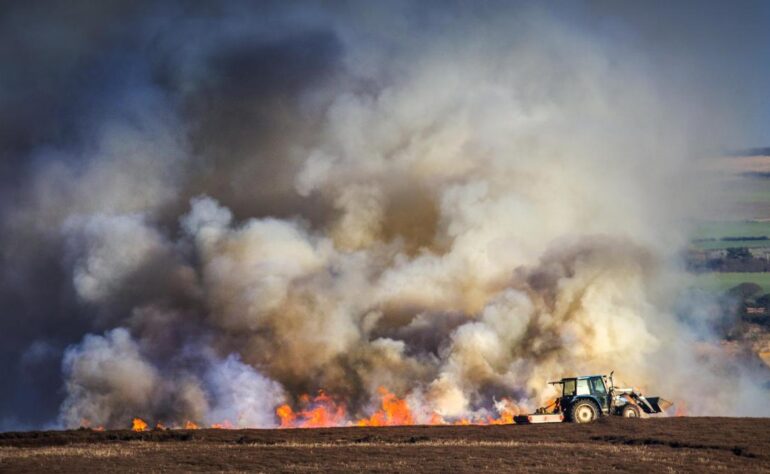Thirteen local authorities and their leaders have teamed up with conservation organisation Wild Moors to encourage the government to take urgent action to protect fragile moorland habitats.
It comes ahead of a review by the Environment Minister Rebecca Pow in the spring which will consider whether to extend existing legislation to implement a complete ban on burning peatlands for grouse shooting.
Across England’s uplands grouse moors continue to set fire to carbon-rich peatlands to cultivate younger, more nutritious heather for game birds to eat. Since the burning season began on 1 October over 365 incidents of grouse moors burning on peatlands have been reported to Wild Moors.
Luke Steele, Executive Director for Wild Moors, said:
“Most people want to see the environment protected, so it makes no sense for the government to allow the nation’s largest natural carbon stores to continue being burnt for grouse shooting. Especially when we need to be protecting and restoring, not torching, peatland habitats to help fight climate change.
“Defra has the option to extinguish grouse moor burning on some of England’s most fragile and important peatland sites — it must take it.”
The nation’s peatlands store more carbon than all the forests in the UK, France and Germany combined. But grouse moor burning has become the biggest threat to these important conservation sites. Subsequently, only 4% of England’s upland peat is in favourable condition which is resulting in these important habitats converting from carbon stores into carbon emitters.
In recognition of the environmental damage caused by burning the government introduced a partial ban on the practice in May, acknowledging that “burning is damaging to peatland formation” and “makes it more difficult or impossible to restore these habitats to their natural state”.
However, Wild Moors is warning that many of Britain’s grouse moors are exempt from the new rules because they are located on degraded shallow peat, not blanket bog. This is despite them urgently needing to be restored to a healthier, deeper state to help tackle climate change, flooding and biodiversity loss.
The Climate Change Committee, which advises the government on environmental action, has recommended that grouse moor burning is completely banned to protect peatlands from further damage.
Ends
Notes to editors
See here to find out more about grouse moor burning
The local authorities and their leaders backing a ban on grouse moor burning are Barnsley, Bradford, Calderdale, Doncaster, High Peak, Kirklees, Lancaster, Leeds, Redcar, Sheffield, Staffordshire Moorlands, Wakefield and York.
For more information or interview requests please contact Wild Moors on info@wildmoors.org.uk
Wild Moors campaigns to unlock an area of uplands the size of Greater London from grouse shooting for nature restoration by 2030. By working with communities, companies and governments to solve challenges facing the upland environment Wild Moors acts as a catalyst for creating effective and lasting change.
